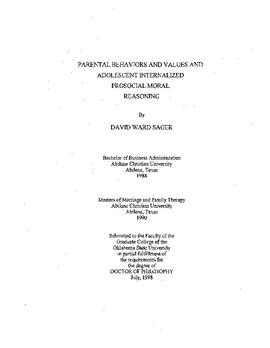| dc.contributor.advisor | Henry, Carolyn S. | |
| dc.contributor.author | Sager, David Ward | |
| dc.date.accessioned | 2016-04-25T14:53:21Z | |
| dc.date.available | 2016-04-25T14:53:21Z | |
| dc.date.issued | 1998-07 | |
| dc.identifier.uri | https://hdl.handle.net/11244/33588 | |
| dc.description.abstract | Scope and Method of Study: The purpose of this study was to examine the relationship between selected demographic variables (age, gender, and family form -- two-parent intact families versus other families), adolescents' perceptions of parental behaviors (support, induction, punitiveness, and love withdrawal), and parental values (intrinsic religiosity, altruism, prestige, mental alertness, and parents internalized prosocial moral reasoning) and adolescent internalized prosocial moral reasoning The study sample consisted of 114 adolescents between 13 and 18 years of age, 107 mothers and 84 fathers. The data were collected from a Church of Christ sample through mailout and survey in 8 churches in Texas and Oklahoma. Variables that were significantly related to internalized prosocial moral reasoning in the bivariate correlations were entered as predictor variables of adolescent internalized prosocial moral reasoning in separate hierarchical multiple regression models for mothers and fathers. | |
| dc.description.abstract | Findings and Conclusions: In the fathers' model, four predictor variables were significantly related to adolescent internalized prosocial moral reasoning. Gender of the adolescent (girls reported higher levels of internalized prosocial moral reasoning than boys, family form (adolescents from family forms other than two parent intact reported higher levels of internalized prosocial moral reasoning), fathers' support was positively related to adolescent internalized prosocial moral reasoning, and fathers' love withdrawal was negatively related to adolescent internalized prosocial moral reasoning. In the mothers' model, mothers' support was positively related and mothers' work value of mental alertness was negatively related to internalized prosocial moral reasoning. These findings suggest that parental support, as well as some demographic variables and some work values are all related to adolescent internalized prosocial moral reasoning. | |
| dc.format | application/pdf | |
| dc.language | en_US | |
| dc.rights | Copyright is held by the author who has granted the Oklahoma State University Library the non-exclusive right to share this material in its institutional repository. Contact Digital Library Services at lib-dls@okstate.edu or 405-744-9161 for the permission policy on the use, reproduction or distribution of this material. | |
| dc.title | Parental behaviors and values and adolescent internalized prosocial moral reasoning | |
| dc.contributor.committeeMember | Hubbs-Tait, Laura | |
| dc.contributor.committeeMember | Fournier, David | |
| dc.contributor.committeeMember | Weber, Margaret J. | |
| osu.filename | Thesis-1998D-S129p.pdf | |
| osu.accesstype | Open Access | |
| dc.type.genre | Dissertation | |
| dc.type.material | Text | |
| thesis.degree.discipline | Human Environmental Sciences | |
| thesis.degree.grantor | Oklahoma State University | |
